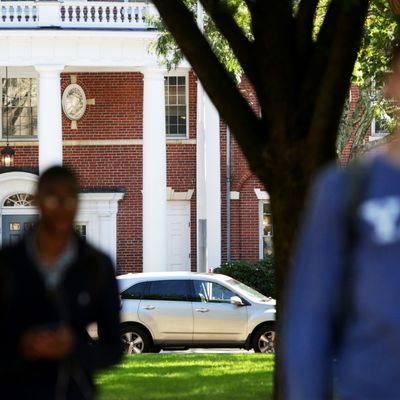
Felicity Huffman, Lori Loughlin, a famous fashion designer, and bunch corporate fat cats paid a life coach to help their children cheat on standardized tests — and buy fraudulent athletic accolades — in order to secure admission to various elite colleges. Then, the Justice Department found out. Now, Huffman is in the hoosegow, America’s largest-ever college admissions prosecution is underway, and all across social media, the upper-middle class is basking in the schadenfreude of old money’s humiliation.
The New York Times offers a succinct summary of the indictment:
At the center of the sweeping financial crime and fraud case was William Rick Singer, the founder of a college preparatory business called the Edge College & Career Network, also known as The Key.
The authorities said Mr. Singer, who has agreed to plead guilty to the charges and cooperated with federal prosecutors, used The Key and its nonprofit arm, Key Worldwide Foundation, which is based in Newport Beach, Calif., to help students cheat on their standardized tests, and to pay bribes to the coaches who could get them into college with fake athletic credentials.
[United States attorney Andrew] Lelling said that Ms. Huffman participated in the SAT cheating portion of the scam.
Mr. Singer also bribed Division 1 athletic coaches to tell admissions officers that they wanted certain students, even though the students did not have the necessary athletic credentials.
This is a very amusing criminal conspiracy. And it is refreshing to see any wealthy person actually pay a penalty for trying to rig our putative “meritocratic” institutions in their progeny’s favor. But these facts should not distract us from the broader truth: All of American higher education is, in essence, a giant pay-to-play scandal.
Some of the perfectly legal, anti-meritocratic features of college admissions are wholly transparent. It’s hard to discern much difference between the unearned advantages that William Singer’s clients enjoyed, and the ones that Harvard’s legacy admissions do. But the problem is much broader than that.
I didn’t get into Johns Hopkins University because of my father’s name, or my fabricated triumphs at high-school water polo. Rather, I earned my admission the old-fashioned way: by getting a decent score on the SATs, racking up extracurriculars, and cheating off the nerd I sat next to in AP Bio.
But my competitive application was underwritten by my professional-class parents’ wealth. My SAT scores were the product of hours of tutoring, and my writing skills were honed in pricey summer classes, which most American families cannot afford. And before all that, my parents’ economic security enabled them to buy a home in a suburb with a coveted school system that featured better-qualified teachers and smaller class sizes than most working-class kids are provided. I did not earn these advantages. My parents purchased them for me.
And in this respect, I am not atypical. In America, a student’s household income strongly correlates with her educational attainment. Meanwhile, social mobility is much lower in the United States than in Europe — and has been steadily declining in recent decades. A 2014 study by economists at Harvard and Berkeley found fewer than 10 percent of those born into the bottom fifth of wealth distribution make it into the top fifth. The middle class fared only slightly better — roughly 20 percent of those born into the middle fifth reached the top fifth by the end of their lives. America’s class hierarchy is rigid. And it’s kept that way, in no small part, by an education system that allows the “haves” to buy their children seats in the best-funded public schools, test-gaming lessons with the finest tutors, and all manner of privately provided extracurricular enrichment.
Equality of opportunity is an impossible ideal. Meritocracy is a cruel joke. The real scandal isn’t all the unethical shenanigans rich parents will engage in to keep their failsons and faildaughters from tumbling down the socioeconomic ladder — it’s that we use adolescents’ test scores to ration economic security in the first place. According to Labor Department projections, most of the fastest-growing occupations in the U.S. do not require a college diploma. Our economic system needs a ton of new home health-care aides, solar panel installers, and food-service employees in order to function. Which is to say: It needs a lot of its young people to either fail to get into college, or else to secure degrees they don’t ultimately use. Keeping the one percent’s underachievers out of Yale won’t win economic justice for ordinary workers. Only redistributing the gains of growth away from the affluent — including the overachievers who “earned” their Phi Beta Kappa keys — can do that.
More From the College Admissions Scandal
- College Admissions Scam Fallout: What Happened to Everyone in the Scandal
- Fencing Coach’s Fishy Home Sale Brings Admissions Scandal to Harvard
- The Department of Education Is Investigating Schools in Varsity Blues Scandal






























